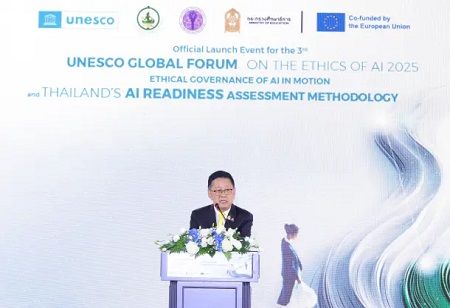-
Bangkok will host UNESCO's Third Global Forum on the Ethics of AI from 25-27 June 2025, marking the forum's debut in Asia
Thailand’s Deputy Prime Minister and Minister of Digital Economy and Society, Prasert Jantararuangtong, has announced the country will host UNESCO’s Third Global Forum on the Ethics of AI in June 2025, marking the first time the landmark event will take place in Asia.
In parallel, Thailand is rolling out the UNESCO Readiness Assessment Methodology (RAM), a comprehensive diagnostic tool that indicates where countries stand regarding AI infrastructure, governance, investments, social policy, and public institutions. This aids countries in the ethical development, governance, and use of AI, ensuring alignment with human rights and the Sustainable Development Goals.
'Thailand can be a learning hub in AI governance, and it is ready to collaborate with UNESCO in sharing knowledge and experience with others for the ethical development and application of AI,' said Mr Jantararuangtong at a launch event for the Global Forum on 4 December. The Deputy Prime Minister said that the event and the rollout of the RAM underscores Thailand’s leadership in implementing responsible, transparent, and equitable AI solutions.
'Over the past two and a half years, UNESCO has been implementing its Recommendation on the Ethics of AI around the world by building the capacity of governments to translate provisions related to human rights, dignity, sustainability, and fairness, into concrete policy action through our Readiness Assessment work with nearly 60 countries,' Gabriela Ramos, Assistant Director-General for Social and Human Sciences of UNESCO said. 'The Third Global Forum will set the stage to take these efforts to a higher level, through international cooperation and peer learning,' she added.
In the Asia-Pacific region, home to almost 60% of the world’s population, experts expect AI to have profound impacts across health, education, and governance. With Southeast Asia attracting more than $30 billion in AI infrastructure investments in the first half of 2024 alone, the Association of Southeast Asian Nations (ASEAN) has projected that AI could boost the region's gross domestic product by 10%–18%, potentially adding US$1 trillion by 2030. However, significant challenges remain. A persistent digital divide, including a gender divide, means that uneven AI adoption risks worsening inequalities in the region. Meanwhile, with generative AI already being used to influence election outcomes around the world, the World Economic Forum’s Global Risks Report 2024 identifies societal polarization driven by disinformation as the most severe short-term risk, globally. By bringing the Global Forum to Asia, UNESCO aims to ensure these critical issues are addressed in an open, inclusive manner.
'We must not repeat the exclusionary patterns we’ve seen in global debates on issues like climate change, where voices from the Global South are too often marginalized,' said UNESCO Regional Director Soohyun Kim at the launch event in Bangkok.
UNESCO held its first Global Forum on the Ethics of AI in Prague, Czech Republic in 2022, aiming to promote international collaboration among policymakers, industry innovators, and civil society on ethical AI governance. Along with the second Global Forum, in Ljubljana, Slovenia, it focused on encouraging governments, civil society, and private sector entities to adopt UNESCO’s November 2021 Recommendation of the Ethics of AI, the first-ever global standard on this issue.
UNESCO’s Third Global Forum is expected to bring more than 800 delegates from 194 Member States to Bangkok under the theme, 'Ethical Governance of AI in Motion.' It will highlight critical issues such as AI's impact on human rights, gender equality, and sustainability, and feature dynamic discussions, expert panels, and strategies to align innovation with ethics, organizers said.
In his keynote speech, Deputy Prime Minister Jantararuangtong emphasized Thailand’s forward-thinking approach to AI and early adoption of governance frameworks. UNESCO Deputy Director-General Xing Qu called the upcoming forum 'pivotal' saying it would foster global dialogue, 'ensuring that AI technologies serve all of humanity and leave no one behind.'
Thailand ranks among global leaders in AI adoption, with 62% of workers already using generative AI in their daily lives, according to a recent report by SEEK, in collaboration with BCG, The Network, and The Stepstone Group. In 2024, nearly three-quarters of Thai organizations had plans for AI adoption—a almost 20% increase from the previous year, Thailand’s Electronic Transactions Development Agency (EDTA) and National Science and Technology Development Agency’s (NSTDA) reported in their AI Readiness Measurement 2024.
As far back as 2021, Thailand implemented a National AI Strategy, which included forming a national AI committee to drive AI adoption across all sectors. The RAM, which assesses a country’s readiness to manage AI from legal, technological, and social perspectives, is set to complement these efforts. To date, almost 60 countries are making use of the RAM to inform AI policies that prioritize inclusivity and ethical governance. In the ASEAN community, seven member states are currently conducting the RAM with UNESCO's support.
Coinciding with the mid-point of Thailand’s National AI Strategy 2022-2027, the RAM’s findings will provide the Thai government with tools to review progress, identify opportunities for change, and strengthen AI development efforts.
They will also aid advocacy efforts across the region, according to UNESCO Regional Director Kim. As chair of the ASEAN Digital Ministers Meeting in 2025, she said, 'Thailand is in a strong position to shape a supportive policy environment for ethical AI governance across South-East Asia, helping to localize the Global Digital Compact within the region.'
🍪 Do you like Cookies?
We use cookies to ensure you get the best experience on our website. Read more...

